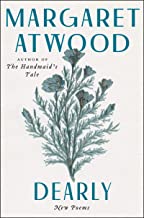Dearly: New Poems, Margaret Atwood 2020
Atwood is a much loved Canadian author with a number of Booker Prizes and assorted international honors who is primarily known for her novels (The Handmaid’s Tale) but who has written 15 volumes of poetry as well.
Familiar themes of love, loss, aging, death, and the contrast with the everlasting elements of nature appear throughout, but my favorite section of the book is the final one which deals with the loss (real or future?) of her life partner and the relentless march of time and its toll on the human body. These poems are not depressing, though they do confront one with the inevitability of loss—loss of physical beauty and capacity, loss of words, loss of loved ones. The poems are powerful because they’re so quiet. Wonderful images and turns of phrase, irony and empathy, sadness and memory all combine to help one ease along the path towards what Atwood refers to as It in her poem Silver Slippers:
No dancing any more, but still/wearing my silver shoes
my silver slippers/all of their wishes used up
and no way to get home./I’ll skip dinner, the kind with linens
and candles lit for two. I’ll be alone,/sitting across from an absence.
Oh, where did you go, and when?/It wasn’t to Kansas.
I’ll perch in this hotel room solo/and nibble a square of cheddar
saved up from the plane./Also the salted almonds.
These will tide me over./I won’t be hungry.
I’ll act as if I am busy./But none of this will defend me:
not the silken bedsheets/the pillows ballooning aloft,
not even the happiness travel mag/ with its conjuror’s dreams—-
the winged monkey brain/flying me to neverland,
such coziness and shelter—-/those don’t make up for it.
It, the moment we know is coming,/the click of the seconds
on the skyblue bedside alarm,/countdown as the flying house descends
to silent crash, dead witchy heart/plus empty silver shoes, end stop.
For those of us old enough to have seen The Wizard of Oz as children, with our children, and now with our grandchildren, the imagery and the metaphors are vividly familiar and the contrast with Dorothy and her companions on the yellow brick road who live on in perpetuity on DVD’s and the internet is inescapable.
I had the strong feeling that this section of poems of loss were related to a real event in Atwood’s life but a Wikipedia search failed to identify a husband or companion. Her web site was similarly uninformative until I clicked on the “Go To” icon and then found Remembering Graeme Gibson who is identified as a poet who was Atwood’s partner for more than 45 years. Gibson died in 2019 of a sudden stroke at 85, clearly the inspiration for these final poems of loss, invisibility, and inevitability.
This is a powerful volume worth reading and re-reading.



